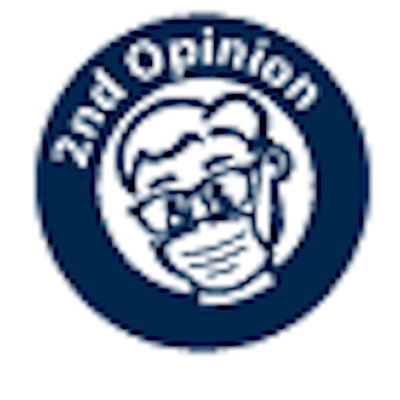
"Limbo" is a concept left over from my Catholic grade school education. Limbo officially does not exist anymore, but what a great idea: a place where everything is neither up nor down, neither here nor there. It's a place of suspension, where you are neither saved nor cursed. Yet.
The ADA Library is currently in limbo.
The ADA House of Delegates (HOD) met last month in San Francisco. Structurally, the ADA Board of Trustees (BOT) and administration perform the work of the ADA at the request of the House of Delegates. At the annual meeting, the HOD lets them know if they have been doing a good job. Their work is reviewed and charges are assigned for the next year.
At this year's meeting, a budget was presented to the House of Delegates that included a 60% cut of monies allocated to the ADA Library. The ADA Board of Trustees and administration went through a long and detailed process to cull out programs that were financially underperforming, and the library was found to be an especially large black hole; in fact, it was judged by the BOT and the administration to be a money pit.
 Mary J. Hayes, DDS, MS, AM.
Mary J. Hayes, DDS, MS, AM.
It has been stated that the financial stability of the ADA was undermined by the library's cost, as less than 1% of the members actually "use" the library. Clearly, an unacceptable return on investment.
But ADA members and friends of the ADA Library took the Board of Trustees and administration to task. Two opportunities were used to inform the House of Delegates that the fate of the library was in their hands and to give them an opportunity to reverse the gutting of the library.
First, testimony regarding the library was presented at the Reference Committee (RC) on Dental Education. Specifically, Resolution 159 was discussed regarding the status of the library within the ADA structure: Is the library of value to the members? Should the library be funded properly? Should the physical collection be packed up, tossed, or "burned"? Should members be allowed to come to the library to work? Should members be allowed to read the books, use the journals, and be assisted by the professional staff?
During this discussion, the line at the microphone was long, with members gathered from all over the country stating that the Board of Trustees and the administration had gone too far. Does it matter that 1% of ADA members use the library when their work product clearly enhances the professional lives of 100% of all ADA members? What about the projects that the library expedites for ADA departments to the direct benefit of members, such as Science, Publishing, and IT?
Modernize the library, of course, but don't strip the function of the special and unique library of the ADA. According to written testimony by Julie Schiavo of the Medical Library Association that was submitted to the Reference Committee, "There is a common misperception that the Internet and electronic collections provide sufficient resources to meet the information needs of the healthcare community and money will be saved if there is a minimal or no physical library collection. This is not true. Digital resources in dentistry lag behind those in other health professions. The unique collection of the ADA Library provides access to patient care information that is not available through electronic means or is only available at a very high cost to the requestor."
The Reference Committee decided that the information and passion they heard justified an RC Resolution, 159RC, to be presented to the entire House of Delegates. Resolution 159RC states that the ADA Library would maintain its physical space and collection for 2013, and that an internal report on the status of the library would be given next year to the 2013 HOD.
ADA's core values
Now the time came for the next go around: the official meeting of the House of Delegates. The ADA Library was but one of many, many topics up for discussion.
The first place it came up was under the budget. The HOD considers the budget separately from individual topics and as presented, the library was defunded. Reconsideration almost happened, but as other issues came up it was voted to leave the 60% cuts for the library in place.
The agenda eventually came to the section on Dental Education business, and the Reference Committee presented Resolution 159RC. Bear in mind that 159RC specifically did not ask for the library's funding to be restored.
Districts 8 and 11 tried to introduce a Substitute Resolution to restore the library's budget, while a special committee would report back to the HOD a targeted strategy to align the functions of the library with membership and organizational needs.
But at the end of the day, Resolution 159RC was passed instead, putting the library in limbo: The collection will not be removed, but more than half of the library staff will be fired as of January 1, 2013. Books will no longer be bought nor lent, 20% to 25% of journal subscriptions are to be discontinued for lack of funds, five librarians will be left to do the work of 13 people, and members will no longer be permitted to "walk in" and use the library.
“The ADA Library is not just a book collection. It is information services, facilitated by a highly trained and professional staff.”
Which brings us to core values. When Kathleen O'Loughlin, DMD, MPH, addressed the House of Delegates as the association's executive director, she set the tone of the meeting by urging HOD members to support the core values of the ADA, specifically education, advocacy, and trust. These values are basic to improve the professional status of dentists, align actions that build value for the ADA, encourage the health of the public, and promote the art and science of dentistry. Dentistry is science-based and, as an association, science informs our strategy to make the right things happen.
Core values help a group such as the ADA grow and transition to the next level without losing focus, purpose, or professionalism. So does closing the ADA Library reflect positively the association's core values? Of course not. In this age of electronic communication, the need for dentistry to be grounded in science and evidence-based research only increases. Facile navigation in the increasingly complex world of information is challenging for the best of us. The skill set of the ADA librarians is needed to guide us efficiently in the dental literature for study, writing, lobbying, lecturing, research, and lifelong learning. It is all about education, advocacy, and trust.
The ADA Library is not just a book collection. It is information services, facilitated by a highly trained and professional staff. It is people who are uniquely knowledgeable about dentistry, whose business for 85 years has been the nuances of our profession's literature and knowledge base. Perhaps the ADA librarians have made it look too easy. How about an overheard suggestion that the "overpaid" librarians be replaced by clerks? Processing journal requests is just copying and filing, right? Ironic, isn't it? I've heard that dentists are "overpaid" for their professional work as well and that midlevel providers make more economic sense.
Time to take action
How does the ADA Library get out of limbo? Can it be saved?
The Board of Trustees meets in early December, and word is that the library will be discussed. Could the librarians be kept on to do their work? Could monies be restored to keep the journal subscriptions from being cut 20% to 25%? Could a strategic plan for the library's future be developed?
Of course the BOT can re-examine its actions. Join your colleagues and become a Friend of the Library. Let the ADA board know you are concerned that the library has been dismantled without a measured plan in place to meet the needs of the ADA's history and future. Hopefully, they will be sensitive to the dismay that so many members have expressed regarding the library's defunding and lack of a business plan going forward.
Transparency is another core value of the ADA ...
BTW: Money talks. As previously reported, the House of Delegate approved dues at $522 per member, an increase of $10, or less than 2%. The 2013 budget passed anticipating a surplus of $1.1 million: $119.7 million in revenue with anticipated expenses of $118.6 million.
Hmmm ... it would seem that the library could have had some, if not all, of its cuts restored after all ($660,000) without jeopardizing the financial stability of the association.
Dr. Mary J. Hayes attended the University of Illinois College of Dentistry, where she earned her Doctor of Dental Surgery and a Master of Science and Certificate of Advanced Study in Pediatric Dentistry. Before her career in dentistry, Dr. Hayes received a Master of Medical Library Science from the University of Chicago. She has spoken all over the world to professional groups about pediatric dentistry and dental education. She has been the recipient of many professional honors, including the Cushing Award from the Chicago Dental Society in honor of her leadership in oral health education. She is a diplomate of the American Board of Pediatric Dentistry and serves the board as an examiner.



















